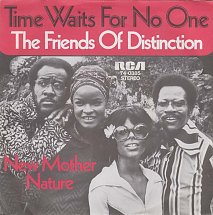
"Breaking Up Is Hard to Do" is a song recorded by Neil Sedaka, co-written by Sedaka and Howard Greenfield. Sedaka recorded this song twice, in 1962 and 1975, in two significantly different arrangements, and it is considered to be his signature song. Between 1970 and 1975, it was a top-40 hit three separate times for three separate artists: Lenny Welch, The Partridge Family and Sedaka's second version.
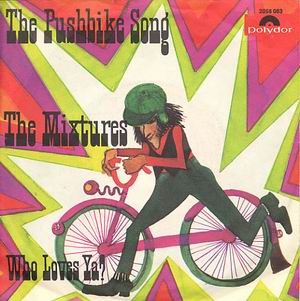
"The Pushbike Song" is a song originally recorded by Australian band The Mixtures and released in 1970. The single was a chart success, reaching numbers one and two in the Australian and UK charts respectively. It has subsequently been covered by various artists.

"Montego Bay" is a song co-written and performed by Bobby Bloom about the city in Jamaica of the same name. The song was a Top 10 hit for Bloom in the Fall of 1970 on both sides of the Atlantic. It reached #3 on the UK Singles Chart, #5 on the Canadian RPM 100 Singles Chart, #7 on the Australian Go-Set Singles Chart and #8 on the US Billboard Hot 100. The song was co-written and produced by Jeff Barry. In the master tape of the song, Bloom breaks into a chorus of "Oh, What a Beautiful Mornin'" at the end of the recording. The song features a whistler, as well as Jamaican instruments in a calypso style.

"Travelin' Man" is an American popular song, best known as a 1961 hit single sung by Ricky Nelson. Singer-songwriter Jerry Fuller wrote it with Sam Cooke in mind, but Cooke's manager was unimpressed and did not keep the demo, which eventually wound up being passed along to Nelson. His version reached No. 1 on the Billboard Hot 100. It was released as a double A-side with "Hello Mary Lou", which reached No. 9 on the same chart. In the United Kingdom, "Travelin' Man", coupled with "Hello Mary Lou", reached No. 2, becoming Nelson's biggest UK hit. Nelson is accompanied on the recording by the vocal quartet, The Jordanaires.

"C'mon Marianne" is a song composed by L. Russell Brown and Raymond Bloodworth and popularized by The Four Seasons in 1967. Produced by Bob Crewe, the single was the last Four Seasons single to reach the Top Ten of the Billboard Hot 100 chart in the 1960s, and their last Top Ten hit until "Who Loves You" in 1975.
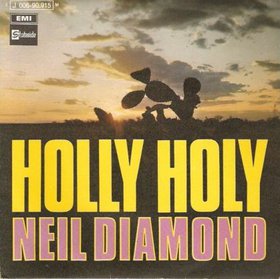
"Holly Holy" is a song written and recorded by Neil Diamond with instrumental backing provided by the American Sound Studio house band in Memphis. Released as a single on October 13, 1969, it was a successful follow-on to "Sweet Caroline", reaching #6 on the U.S. pop singles chart by December. The song also reached #5 on the Easy Listening chart. It became a gold record and then eventually a platinum record.
"A Song of Joy" is the title of a popular rock song by the Spanish singer and actor Miguel Ríos. It is set to the tune the Ninth Symphony by Ludwig van Beethoven, as arranged by Waldo de los Rios, who specialized in arranging classical music to contemporary rhythms. The same melody is used in the well-known Christian hymn, "Joyful, Joyful We Adore Thee."

"Love or Let Me Be Lonely" is a pop song recorded by the soul group The Friends of Distinction and released as a single in early 1970. The song was a multi-format success, peaking in the top 10 of the Billboard Hot 100 at #6 on May 1, 1970 and at #13 on the R&B chart. On the Adult Contemporary singles charts, "Love or Let Me Lonely" went to #9. The song is ranked as the 63rd biggest hit of 1970.
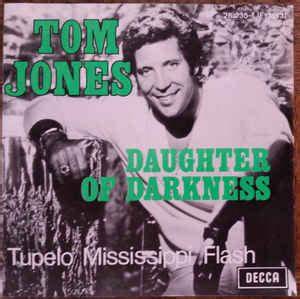
"Daughter of Darkness" is a single by Tom Jones released in 1970 from his album, I Who Have Nothing. The single was a top ten hit in the UK, peaking at number five. In the United States and Canada, Jones just missed the top ten with "Daughter of Darkness", peaking at number 13 and number 11, respectively. The song went to number one in the United States on the Billboard Easy Listening chart in June 1970, and was Tom Jones final of three number ones on the chart.

"Sweet Surrender" is a song written by David Gates and performed by Bread. The single was the second release from their fifth album, Guitar Man, and was the last of four number ones for Bread on the US Easy Listening chart. "Sweet Surrender" spent two weeks at number one on the chart, while on the Billboard Hot 100, it peaked at number 15.
"The Immigrant" is a 1975 single written by Neil Sedaka and Phil Cody and performed by Sedaka. The single was the second release from his album, Sedaka's Back. "The Immigrant" was dedicated to John Lennon and the immigration problems that he faced. The single peaked at number 22 on the Billboard Hot 100 and spent one week at number one on the Easy Listening chart in May 1975.

"Next Door to an Angel" is a rock and pop song written by Neil Sedaka and Howard Greenfield and recorded by Neil Sedaka in 1962. It was issued by RCA Victor Records. It reached No. 5 on the Billboard Hot 100 in late 1962. "Next Door to an Angel" also went to No. 19 on the Hot R&B Singles chart. It was Sedaka's last appearance on the American Top 10 until "Laughter in the Rain" in late 1974.

"Joy" is a 1971 instrumental pop hit record by Apollo 100. It is a contemporary rendition of a 1723 composition by Johann Sebastian Bach entitled "Jesu, Joy of Man's Desiring", shortened to simply "Joy".

"Never Ending Song of Love" is a song written by Delaney Bramlett, and, according to some sources, by his wife Bonnie Bramlett. It was originally recorded with their band, Delaney & Bonnie & Friends, in 1971 on the album Motel Shot. Released as a single by Atco Records the same year, "Never Ending Song of Love" became Delaney & Bonnie's greatest hit on the pop charts, reaching a peak of #13 on the Billboard Hot 100 and number eight Easy Listening. It reached #16 in Australia.

"Get Up and Boogie" is a song by German disco act Silver Convention from their 1976 second album of the same name. The song was written and composed by Sylvester Levay and Stephan Prager, and produced by Prager. The song was released as the lead single from the album Get Up and Boogie in 1976.

"Friends" is an international hit song composed and performed by English musician Elton John with lyrics by his longtime collaborator Bernie Taupin. It was John's third U.S. hit, and his second to reach Top 40 after the breakthrough success of "Your Song".

"Summer " is a song by American singer Bobby Goldsboro, recorded for his album of the same name and released as a single in June 1973. It was written by Bobby Goldsboro, Ashley Abram and Timmy Tappan, and produced by Goldsboro and Bob Montgomery.

"Rainy Jane" is a song written and originally recorded by Neil Sedaka in 1969, covered two years later by Davy Jones. Sedaka's rendition became a minor hit in the U.S., Canada and Australia.

"Puppet Man" is a song written by Neil Sedaka and Howard Greenfield. It was originally recorded by Sedaka on his 1969 Workin' on a Groovy Thing LP. The first hit version was by The Fifth Dimension in 1970. The following year it was also a hit for Tom Jones.
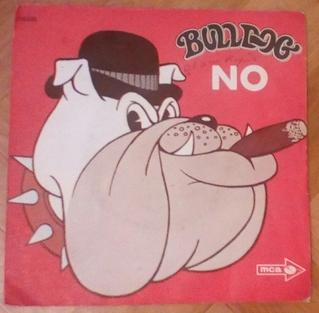
"No" is a song by American pop-rock group Bulldog. It was the first release from their 1972 eponymous debut album. Vocals are provided by bassist Billy Hocher, with a sound similar to Joe Cocker.
